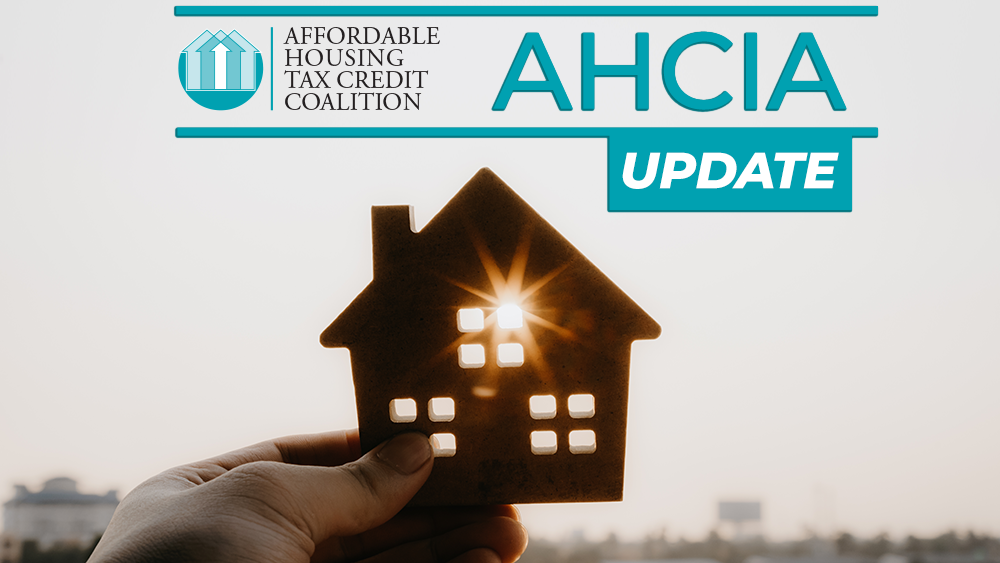The AHTCC applauds the reintroduction of legislation that would expand and strengthen the Low-Income Housing Tax Credit (Housing Credit) and finance nearly 2 million additional affordable homes than otherwise possible over the next ten years, according to analysis by Novogradac.
The Affordable Housing Credit Improvement Act (AHCIA) of 2023 (S. 1557; H.R. 3238) was introduced today in the Senate by Senators Maria Cantwell (D-WA), Todd Young (R-IN), Ron Wyden (D-OR), and Marsha Blackburn (R-TN) and in the House by Representatives Darin LaHood (R-IL), Suzan DelBene (D-WA), Brad Wenstrup (R-OH), Don Beyer (D-VA), Claudia Tenney (R-NY), and Jimmy Panetta (D-CA) plus more than 60 bipartisan original co-sponsors. The cosponsors include 34 Republicans and 32 Democrats, and 29 members of the Ways and Means Committee with jurisdiction over the Housing Credit – more than two-thirds of the committee. The legislation comes at a time when the shortage of affordable housing across the country has reached historic levels. See the bill text and a summary of the legislation here.
“Since the Affordable Housing Credit Improvement Act was first introduced in 2016, the affordable housing crisis has only worsened, and the need to take action on affordable housing is urgent,” said AHTCC Chief Executive Officer Emily Cadik. “This important legislation will finance nearly two million homes nationwide at a time when rents are skyrocketing, even in many places once considered affordable. We applaud the leadership of the AHCIA’s bipartisan leads and co-sponsors and urge Congress to finally enact these bipartisan proposals this year.”
“The Housing Credit is a proven tool that has leveraged public resources and private sector investment and oversight to finance nearly all new affordable housing produced and preserved in our country – over 3.7 million affordable homes since inception,” said Ryan Sfreddo, President of the AHTCC Board of Directors and President of Red Stone Equity Partners. “The AHCIA will allow us to provide even more desperately-needed affordable homes to working families, seniors, veterans, rural communities, Native Americans and people with disabilities in communities across the country.”
The AHCIA of 2023 builds on prior versions of the AHCIA that have earned widespread bipartisan support since first introduced in 2016. Several key pieces of this legislation have been enacted, including a temporary 12.5 percent Housing Credit allocation increase and a flexibility known as income averaging in 2018, a minimum 4 percent Housing Credit rate in 2020, and a provision that would make the Housing Credit more compatible with energy and solar tax credits in 2022. However, the key provisions that would have the greatest impact on affordable housing production are still in need of enactment.
The AHCIA of 2023 includes the AHTCC’s top two Housing Credit priorities: a proposal to restore the expired 12.5 percent Housing Credit allocation increase and further increase the Housing Credit allocation, as well as a proposal to lower the private activity bond financing threshold from 50 percent to 25 percent. These two proposals alone would finance the production of 1.62 million more affordable homes nationwide than otherwise possible. Other proposals in the legislation would provide states with additional flexibilities, streamline program rules, and make the Housing Credit more efficient in hard-to-reach rural and Native American communities. The AHCIA of 2023 also includes several minor changes from the prior version.
Bill Information and Resources
For more information about the details of the legislation, see a press release from the office of AHCIA lead sponsor Rep. LaHood and other lead co-sponsors, a summary of the provisions below, the full breakdown of provisions included in the AHCIA of 2023 here and the changes from the prior version here.
Bipartisan Support for the AHCIA
The AHCIA was first introduced in Congress in 2016, and has had strong bipartisan support since then. In the 117th Congress, the AHCIA of 2021 gained the support of nearly half of the House and Senate. The AHTCC thanks the lead sponsors of the AHCIA of 2023 for their support for the Housing Credit and leadership on the AHCIA, and look forward to working with them to take action on affordable housing through expanding and strengthening the Housing Credit.
The Senate version of the AHCIA of 2023 is led by Senators Maria Cantwell (D-WA), Todd Young (R-IN), Ron Wyden (D-OR), and Marsha Blackburn (R-TN).
The House version of the AHCIA of 2023 is led by Representatives Darin LaHood (R-IN), Suzan DelBene (D-WA), Brad Wenstrup (R-OH), Don Beyer (D-VA), Claudia Tenney (R-NY), and Jimmy Panetta (D-CA). The House bill already has 60 original cosponsors in addition to these six lead sponsors.
|
|
|
|
Key Provisions in the AHCIA
The AHCIA of 2023 would:
- Increase affordable housing production and preservation
- Restore the 12.5 percent cut to the Housing Credit allocation and further increase the annual Housing Credit allocation by 50 percent over current levels, phased in over 2 years
- Expand access to Housing Credits and more efficiently use Private Activity Bond financing by reducing the bond-financing threshold from 50 percent to 25 percent
- Better serve hard-to-reach areas and populations
- Make more developments serving extremely low-income (ELI) and formerly homeless tenants financially feasible through a 50 percent basis boost if needed for financial feasibility, with minor changes to this provision (outlined below)
- Encourage developments in rural and Native American communities through a 30 percent basis boost if needed for financial feasibility
- Facilitate the revitalization of higher-poverty communities and the development of more properties in high-opportunity areas by removing the Qualified Census Tract population cap and increasing the Difficult Development Area population cap
- Remove barriers to affordable housing preservation
- Facilitate safe tenant relocation during the rehabilitation of Housing Credit properties by allowing relocation costs to be capitalized by the Housing Credit
- Ensure properties are given enough time to rebuild after a casualty loss
- Allow flexibility for existing tenants’ income recertifications when refinancing properties
- Streamline program rules and promote efficiency
- Prohibit local approval requirements that can prevent developments from moving forward due to Not in My Backyard (NIMBY) opposition
- Clarify that states can determine the definition of a community revitalization plan
- Better align Housing Credit rules with the Violence Against Women Act
- Ensure that rules designed to prevent college students from living in Housing Credit properties do not unfairly penalize residents seeking to further their education
- Add cost reasonableness as a Qualified Allocation Plan selection criteria
Changes from the prior AHCIA of 2021 include:
- Technical changes to the ELI basis boost provision to clarify congressional intent
- Clarifies that any ELI units receiving the 50 percent basis boost are rent restricted to be affordable to households at 30 percent of area median income
- Clarifies that the 20 percent of units that must be designated for ELI households in order to qualify for the 50 percent basis boost are calculated as a unit fraction, not floor space fraction
- Removing the energy provisions that were enacted in the IRA: eliminating the basis reduction for the Section 45L New Energy Efficient Home Credit and Section 48 Investment Tax Credit when used with the Housing Credit; the AHCIA still includes a provision to eliminate the basis reduction when the Housing Credit is used with the Section 179D Energy Efficient Commercial Buildings Deduction, which has not yet been enacted
- Adding a “sense of Congress” provision on data sharing and transparency, which states that steps should be taken to share data and identify other ways to increase the transparency of the program
- There is one change in the Senate bill only, which is a “sense of Senate” on pursuing policies to address zoning and other regulatory barriers that impede affordable housing production
Advocate for the AHCIA & Resources
Resources
|
|



Comments are closed.